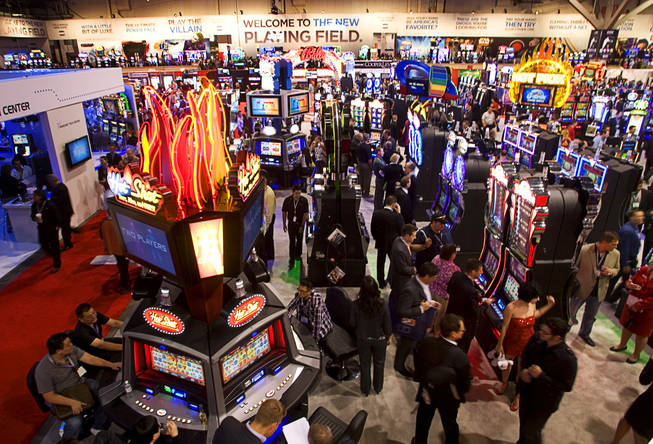
Attendees look over slot machines at the Bally booth during the Global Gaming Expo (G2E) at the Las Vegas Convention Center Tuesday, November 16, 2010.
Saturday, Nov. 20, 2010 | 2 a.m.
Sun archives
Sun Coverage
Slot machine manufacturers, beaten up by gamblers who often complain about tight machines, have redirected their marketing campaign.
Three years into a recession that has decimated discretionary spending, slot makers at this week’s premier trade show eagerly showed off their newest creations — and explained how the games aim to offer players more bang for their buck.
Aristocrat Technologies, for example, is developing games that offer a chance to win smaller amounts of money more frequently, allowing wagerers to play longer.
Many of these new games are programmed for more frequent bonus rounds — free side games. The company’s upcoming “Reel Tall Tales” machines will hit one of five bonus sequences every nine or so spins. Its “Rockin’ Olives” machine, designed by Las Vegas pop artist Michael Godard, hits a bonus about one every three spins.
“This keeps players entertained so they get more out of the game,” said Mitchell Bowen, Aristocrat vice president of marketing. “Instead of putting in their money and losing it right away, they might get 30 minutes out of that $20.”
Some new games let players access top cash bonuses without betting the maximum allowed for each spin.
Bally Technologies’ “Money Wheel,” for example, allows players a chance at extra cash by touching a digital wheel and betting 40 cents instead of a maximum $2 per spin.
“We are moving away from people having to bet up in order to win bonuses,” Bally Chief Operating Officer Gavin Isaacs said.
Because slots are programmed with a house edge to guarantee a return on the casino’s investment over time, there’s a trade-off to letting gamblers win incremental amounts more frequently. The result is that they lose money more slowly over time. But less volatile games mean players won’t win the giant jackpots that are hallmarks of the casino experience.
Some industry executives say slots will continue to turn off players in the bad economy unless manufacturers change how the games work.
“These multiline, high-volatility games grind through (players’) bankrolls,” said David Brents, general manager of the Morongo Resort in California.
His casino has lost gamblers, he said, and remaining customers aren't spending much less than they were before the recession, he said.
Some players get a false sense of value from a low denomination game, like “penny” games that accept maximum bets of $2, Brents said. In fact, he said, these players’ bankrolls are likely yielding 65 percent as much gambling time compared with five years ago.
Better value games aren’t just an issue of math, companies say.
The next wave of slot machines appears glitzier than today’s models, with brighter displays, crisper graphics and more layered screens for 3D appearances. Manufacturers say these improvements, which let gamblers interact with the games in new ways, are tested on players to make sure they are worth their development costs.
WMS Gambling’s “Attack From Mars/Revenge From Mars” lets players toggle back and forth between games featuring attacked humans or menacing aliens. Players accumulate “trophies” like “Save the world” or “Abducting makes me hungry” and can choose to zap aliens or suck up earthlings by touching the screen, the gambler’s captain’s chair rumbling with the sound of an apparent spaceship hurtling into space.
International Game Technology’s “Reel Edge” slots allow players to stop each reel exactly where they want by touching the screen — although the lighted coffins, dead roses and “bar” symbols flit by too fast to hand-select a jackpot.
“People want value for their money,” IGT Chief Technology Officer Chris Satchell said. “We make games for all kinds of players. You’re always going to have that segment of gamblers who want high volatility games. But we also provide entertainment value. Nowadays, people want more features and interactivity.”
A high-profile example is IGT’s slot machine based on the Batman movie “Dark Knight,” which lets players choose whether to play the game as Batman or his nemesis, the Joker. During one bonus round, a 103-inch screen overhead shows movie clips and an animated car chase involving the two characters. Players swipe the screen to reveal cash prizes that are, for example, revealed under an array of digital playing cards that flip over when touched.
WMS’ “Pirate Battle” features a bank of four slot machines at which two players from a “red team” can compete against players on a “blue team.” If a player hits a bonus round, two digital pirate ships shoot cannonballs at each other on an overhead screen. The company’s slot based on “The Godfather” movie allows players to refuse a guaranteed bonus prize for the chance to win higher amounts of money — or nothing at all.
Bally’s “Hot Pick” game allows players to select among nine wheels with different numerical values before spinning for a cash bonus.
Other games invite players to touch the screen simply for fun. Bally’s “Cash Wizard” game includes a tiny, doll-like figure with a pointy hat who giggles when touched. IGT’s “Puppy Stampede” slot features animated dogs that scamper across the spinning reels and squirm when players touch them.
Satchell has activated a “Dark Knight” game with the Joker as protagonist.
“The best outcome is for someone to feel great even though they lost that $20 so they say, ‘That was worth my money,’ ” he said.
CORRECTION: This story was corrected to reflect that David Brents said customers aren't spending much less than they were before the recession. It originally said customers are spending much less than they were before the recession. | (November 22, 2010)


Join the Discussion:
Check this out for a full explanation of our conversion to the LiveFyre commenting system and instructions on how to sign up for an account.
Full comments policy